It has indeed been a very busy, but rewarding, week with a trip to the March for Life in Washington D.C., Ecumenical Prayer Service and Mass for those organizing the upcoming Men�s and Women�s Conferences. The conferences will be held on March 17 and 18 respectively.
The Mass for those organizing the conferences was held on Saturday morning at St. Michael Parish in Bedford with pastor Father Mark Sheehan. We celebrated the Mass of St. Sebastian, who is certainly a wonderful role model for men. He was martyred, not once, but twice.
Sebastian was serving in the Roman army in the late third century. His military post exposed him to many Christians who were about to be martyred during the Diocletian persecution. He comforted them, encouraging them to remain resolute in their faith and not apostatize. He also converted many to Christianity. Eventually, he was discovered and sent to be executed by archers (sort of an ancient firing squad.) His body was riddled with arrows and he was left for dead � but he was not. Once he recovered from his wounds, he confronted the emperor for his cruelty against Christians, for which the emperor ordered him seized and beaten to death with cudgels.
The Mass at St. Michael�s was a wonderful event, with many parishioners in attendance, but also the captains from the various parishes who are working on the Men�s Conference as well as some of the women who are involved with the Women�s Conference, particularly Jennifer Schiller from Holliston. She addressed the group at the breakfast and was encouraging the men to try to identify people in the parishes to help her with the women�s conference. The men�s conference has sort of an infrastructure now that the women�s conference does not yet have. Although, the women don�t need as much encouragement to go to something like this as we found out last year when in a matter of weeks they were able to bring together a wonderful conference!
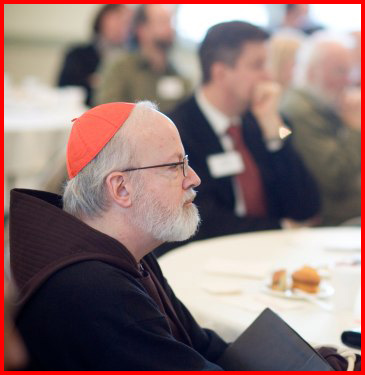
I thanked the captains for their efforts in organizing the Conferences and I told them that their personal invitation to others will make the difference in many instances between whether that person will become an active member of the Church or not. Many people are just waiting to be invited. In this, I told them, each of us has a particular responsibility and an opportunity to make a difference, to reach out and to help people to find their way to a community of faith and a relationship to the Lord with our brothers and sisters.
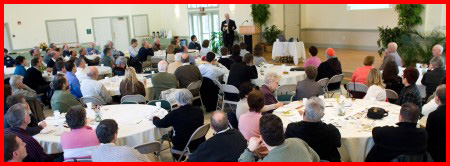
The presentation of Scot Landry, one of the co-founders of the Men’s Conference
We live in a world that is so individualistic, and many people see religion as being a very personal spirituality. But we know that Jesus came to establish a community of faith, a Church of people. It is in that context that we are able to fulfill our mission as God�s people, so we need to come together. As I also told the people at the march in Washington, the experience of loving the same things � loving the Lord, loving the Church, loving the sacraments, loving the Holy Father, loving the Blessed Virgin � binds us together. The solidarity is so strong when we love the same things and the same people! That�s what the Church is all about, and to build that solidarity we must invite others to know this reality and to experience it.
– – –
On Saturday evening Jan. 20, I celebrated Mass at the eighth annual Cardinal O’Connor Conference on Life, at Dahlgren Chapel on the campus of Georgetown University. Bridget Bowes, a Georgetown senior and Director of the conference, and Mr. Joseph Zwosta, also a senior and chancellor for the University Council of the Knights of Columbus, welcomed me to this important occasion of witness of our committment to life. The Conference was sponsored by Georgetown University Right to Life, a student organization, University Faculty for Life, and the University Council of the Knights.
Actually, Bridgett and I studied at the same Catholic grade school, St. Gabriel’s in Pittsburgh, which still charges no tuition to the students.
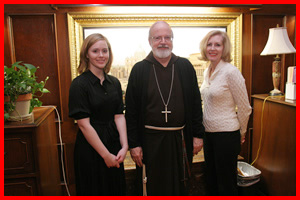
Bridgett Bowes, director of the Georgetown Right to Life Chapter
with her mother Mary Jane Bowes, a Pennsylvania Superior Court justice
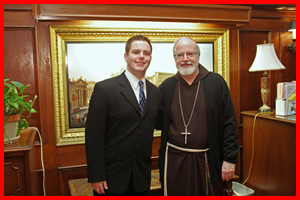
Joseph Zwosta, chancellor of the Georgetown Knights of Columbus
Georgetown is the first Catholic university in the United States, founded by our first American bishop John Carroll in 1789.

This card portraying Bishop Carroll is found
in the Boston archdiocesan archives
More than 600 people registered for the conference, primarily college and university students participating in the March for Life. Mr. Carl Anderson, Supreme Knight of the Knights of Columbus, and Dr. Helen Alvare, professor at the Catholic University School of Law, were among the featured speakers for the weekend program. The Mass was an uplifting occasion and a sign of our well founded hope for the future as hundreds of students gathered to celebrate their faith and to thank God for the precious gift of life.
Many of the Sisters of Life, the community that was founded by Cardinal O�Connor were there. I was also pleased that Father Peter Uglietto, rector of Blessed John XXIII National Seminary, was able to be there with me as well.
The Sisters of Life
– – –
The following day, Sunday, was the Vigil Mass at the basilica, celebrated by Cardinal Rigali from Philadelphia. There were literally hundreds of bishops, priests and seminarians, including our seminarians from Blessed John XXIII.
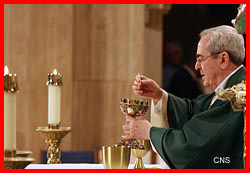
Cardinal Rigali celebrating Mass
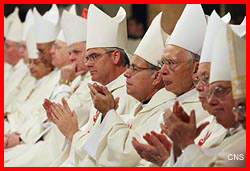
There were many bishops there
Thousands of people gathered in the basilica and hundreds of Catholics came from Boston. There were many seminarians, Catholic school students and parishioners who traveled by bus from this archdiocese.
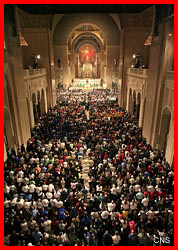
You can see, the Basilica was packed
Marianne Luthin from the Pro-Life Office, Fathers Dan Hennessey and Michael Harrington from the Vocations Office and Steve Colella from the Office of Youth Ministry all worked together to promote the events of the weekend.
I was also asked to celebrate a Mass in the crypt of the basilica the morning of the march. The Mass was for those who arrived on Monday morning and were not able to attend the Mass on Sunday. These were people who came from Pennsylvania, Ohio, places where they had left early in the morning. The crypt was packed for that.

I’d like to share some highlights of my homily with you:
I have read much about a film in the movie theaters today called the Children of Men. The story is about a world twenty years from now. A demographic winter has set in. A group of people resisting the culture of death form the Human Project. The storyline describes a world with no babies, an epidemic of infertility, a hopeless violent world. Finally, one baby is born in secret. During a battle scene, the baby cries and suddenly everyone stops fighting, women want to touch the baby, soldiers kneel and make the sign of the cross. In the midst of the violence and despair, the baby becomes a sign of hope.

A recent article in the British news magazine, The Economist, indicates the present demographic crisis in the West. In the European community there is 1.4 fertility rate � that means that in five years deaths will outnumber births. The most prosperous areas have less children. The fertility rate in Italy and Spain is 1.2, that translates into a population in twenty years to half of what it is today. And the typical citizen will have no brothers and sisters, no cousins, no aunts and uncles. The British news magazine went on to say that our situation in the United States is better because Americans are more devout � we are churchgoers and churchgoers get married and have families. The Churches in the United States are family friendly and nurture family life. They even quote Hilary �It take a village to raise a child� but they added the Church is that village. I like that. I believe it is true. One of the reasons the Church defends marriage in the face of divorce, cohabitation and redefinition of marriage by the Massachusetts Supreme Judicial Court is that marriage and family are the Sanctuary of Life and when that sanctuary is violated, life liberty and the pursuit of happiness, real happiness, society itself is at risk.
Church is a bastion of defense against the culture of death. In terms of the film Children of Men we are �the human project� � the alternative is the culture of death. As the populations of the Western world age, we will see that the generation of parents that aborted their own children, will be euthanized by the children who survived.
A few years ago I saw a photograph in a newspaper or in a news magazine that I found very chilling. A man bound and gagged was kneeling with a gun in the hand of a policeman aimed at his head.
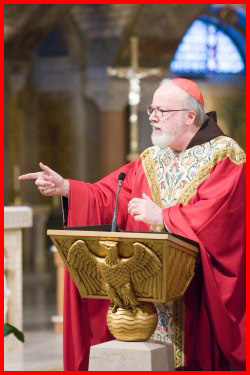
The story line was that this was a Chinese prisoner, perhaps a criminal who was being executed to harvest his organs. I like to think that decent people would be repulsed by this practice, but I do not know. I was horrified to see how American tabloids reported on the execution of Saddam Hussein in a gleeful and jocular manner � making a joke out of an execution � calling the condemned man the king of swing. Such coarseness is something one would associate with the mobs in the Colosseum thirsty for the sight of blood.
Most of us prefer to be removed from such violence. It is considered more civilized to push a button that will cause a bomb to drop on some distant target that we do not have to see or hear the screams of pain or see the burning flesh. That is why the same decent people who would blanche at the execution of the Chinese prisoner can be the enthusiastic supporters of stem cell research � which does not kill a criminal in a far off land but kills innocent human life in our own country funded by our taxes or the monies of corporations whose products we patronize.
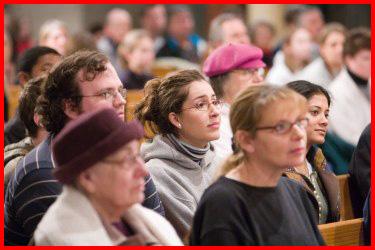
We have come to embrace a new morality that is dehumanizing and dangerous. The new morality is: the ends justify the means. We all want to see a Michael Fox or a Pope John Paul II be cured of Parkinson�s disease. We would all want to see a Christopher Reeve get up out of a wheelchair and walk. We all want to see that, but we do not want to shoot the pickpocket in the head to do it nor do we want to trample innocent human life to achieve so noble an end.
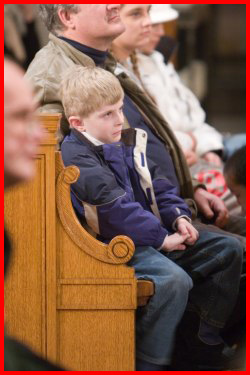
What is most frustrating is that there are moral, ethical experimentations that can get to the place we all want. I often think of those high speed chases where many innocent bystanders have been killed, because someone was trying to catch a bank robber. Was it worth it?
The irony of stem cell research is that the ethical and moral research that does not destroy human life or stoop to cloning has brought about many successes and cures. The immoral destruction of embryos to this point has achieved nothing despite all the media hype.
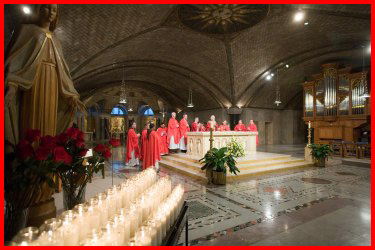
We all want the cures, but the ends does not justify the means. We need to raise the volume in announcing the Gospel of Life. It must not be a strident and hateful scream but a courageous proclamation of the Gospel of Life by witnesses whose lives are transformed by faith, love and a desire to serve. The most eloquent prophet of the Gospel of Life was Mother Teresa.
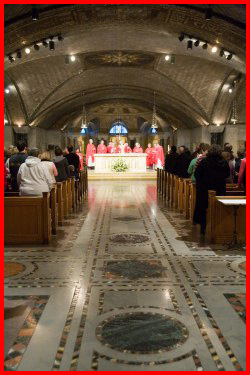
We have become complacent, Bishop McDonnell is always quoting a phrase from Alexander Pope that is very applicable to our modern moral crisis. The English poet wrote: �Vice is a monster of so frightful mien, as to be hated needs but to be seen; Yet seen too oft, familiar with her face, We first endure, then pity, then embrace.�
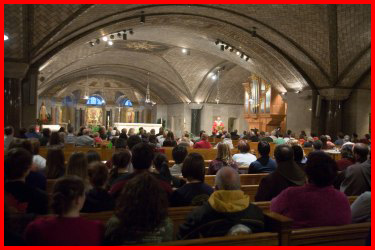
Where is the outrage? As a country we have become callous to the horrors of abortion to human life. The greatest parallel is with slavery in the antebellum period of our history. The people convinced themselves that slavery was necessary, justifiable for economic, social reasons. Today our society is turning a blind eye to abortion and saying that now the ends justify the means. �The losers in this sea charge will be those who are elderly, poor, disabled and politically marginalized. None of these pass the utility test; and yet, they at least have a presence. They at least have the possibility of organizing to be heard. Those who are unborn, infirmed and terminally ill have no such advantage. They have no �utility,� and worse they have no voice. As we tinker with the beginning, the end and even the intimate cell structure of life, we tinker with our own identity as a free nation dedicated to the dignity of the human person. When American political life becomes an experiment on them rather than for and by them, it will no longer be worth conducting.
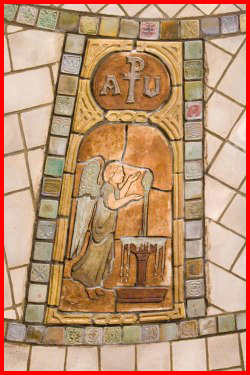
The mosaics of the crypt are very detailed
I thank you for being here today, for defending the Gospel of Life. We must work together to establish a civilization of love where there is room at the table of life for all of our brothers and sisters.
The Eucharist we share is God making a gift of Himself so that we can have the strength to make a gift of ourselves to God and to one another.
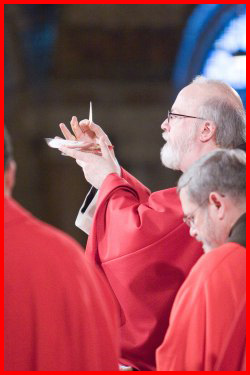
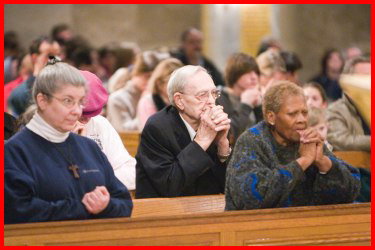
The choice is clear either Civilization of Love or Culture of Death. I am hopeful because Love is stronger than death.
The average life span is 25,000 days. We want to live the days we have left on this planet for God and for our Brothers and Sisters. We are not on a solo flight, we are part of a team, we must work together to fulfill our mission here.
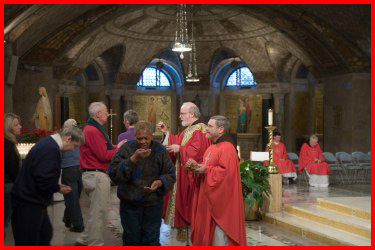
The Eucharist is a special moment in our life. We can miss it if we are too addicted to entertainment. If we gather here in faith to worship the Lord, this Eucharist, the living word of God, the Bread of Life, and the witness of fellow disciples is where we acquire the strength to do what Jesus did, to love the way He loved, to serve the way He served, to suffer the way He suffered.
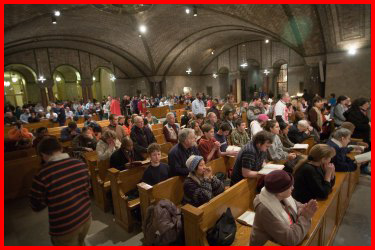
And yes, some people will think that we are crazy but even Jesus� relatives though that Jesus was out of His mind.
The March for Life has always been an extraordinary event in the life of the Church in the United States, and it�s an event that makes a very deep impression on the young people who are there. For young Catholics, who often feel alone in professing the faith, to be in the company of thousands of young people who are committed to the Church, to the sacraments and to defending the Gospel of life, it�s just an exhilarating experience. I�ve always encouraged our high schools and parishes to try to make it possible for many young people to go to the Pro-Life March in Washington and be a part of the wonderful youth Mass there at the MCI Center.
A couple of photos of the youth rally from the Office of Youth Ministry’s web site:
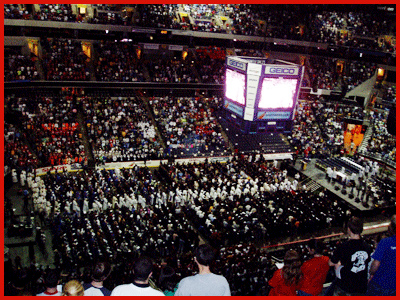
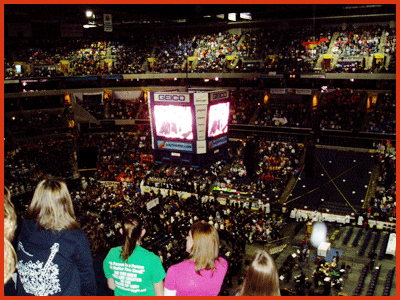
Last year after admitting 20,000 youth, they had to turn them away. 20,000 youth again filled that center this year and more filled another huge center on the day of the march.
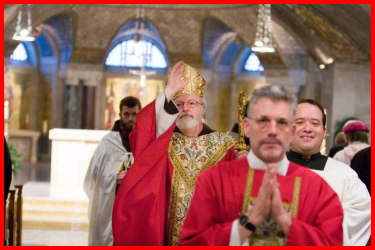
I have been at every march since it began in 1974. Obviously, I was in Washington the first years, but I have always made it a point to return and be part of this event, which I think is a very important witness and a reminder to Catholics.
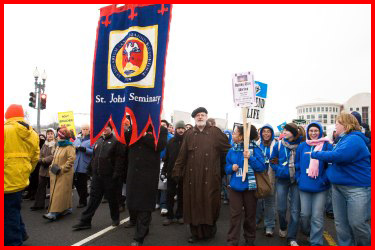
Marching with the seminarians and groups from Boston
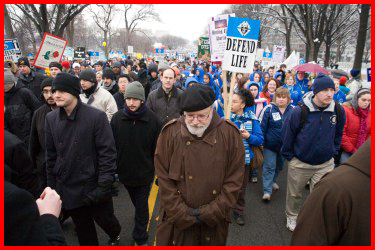
Sometimes Catholics are confused even by Catholic politicians who try to give the impression that because America is a pluralistic society, we have to accept abortion as the law of the land. Just because it�s a pluralistic society, it doesn�t mean we must accept something that is an egregious breach of human rights in the same way that we could not accept the racial segregation that once existed in the country. It was the religious community that was the strongest in helping to change that situation.
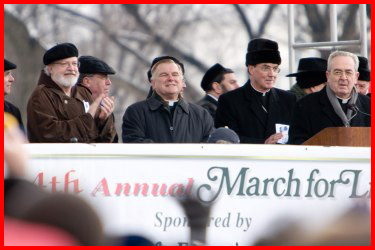
Many bishops were there for the pre-march rally on the National Mall
The witness of having many thousands of Catholics and a big percentage of the leadership of the Catholic Church together on the anniversary of Roe v. Wade, I think, is a very important testimony to the fact that this issue is at the center of Catholic social teaching. You can talk about economic justice, racial equality, women�s rights and many other issues that are important. But if we don�t allow a person to be born, then they�re never going to have the opportunity to enjoy all of those other rights that we also defend. So there�s something very basic and very central about this teaching, and for that reason the Church must continue to be a voice for the culture of life.
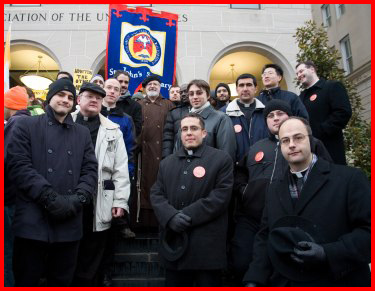
A photo with our seminarians
The fact that EWTN televises the Mass and the march is also a way of letting Catholics throughout the United States feel a part of what is happening there and identify with this important effort to witness to the Gospel of life.
During these decades, I�ve seen the pro-life movement grow. I�ve seen people come to join us from other religious backgrounds. At the beginning, it was a very Catholic event and now there are Jews, Orthodox Christians, Protestants and Mormons � just a whole spectrum of the religious landscape in the United States is represented there.
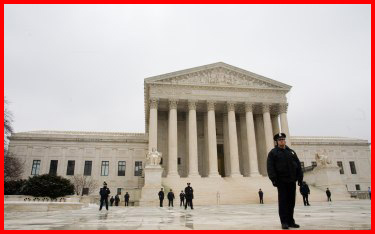
The Supreme Court, the end-point of the march
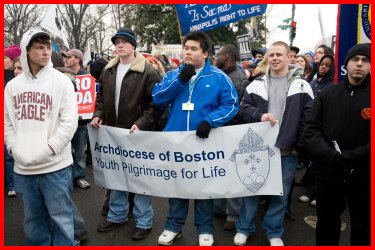
It was great to see so many young faces
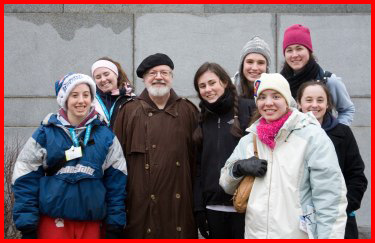
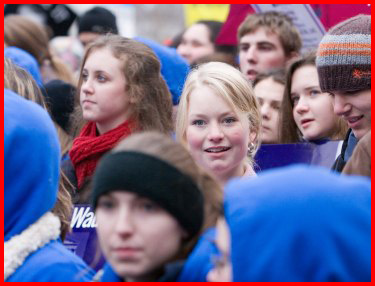
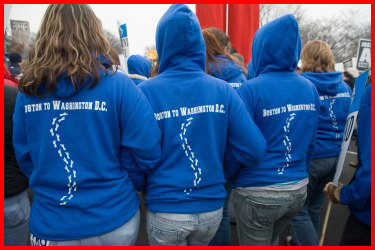
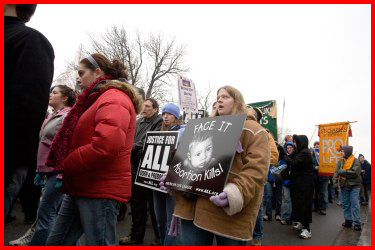
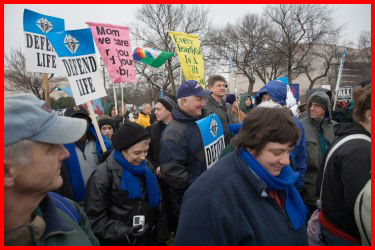
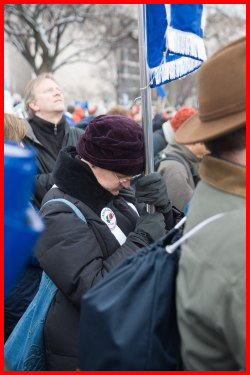
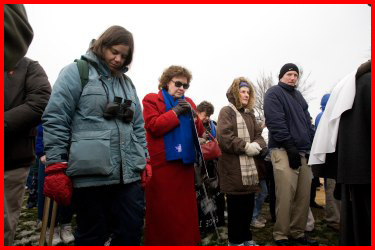
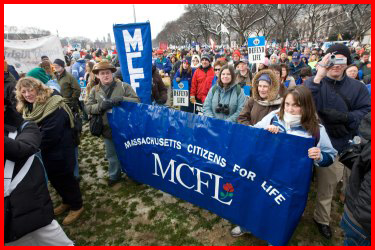
The delegation from the Massachusetts Citizens for Life
– – –
On Wednesday the 24th, we had an Ecumenical Prayer Service to mark the Week of Prayer for Christian Unity at St. John Chrysostom Parish in West Roxbury. The pastor, Father David Michael, did a wonderful job in bringing it together, and Father Ed O�Flaherty, director of Ecumenical and Interreligious Affairs, designed the program. We had readings, songs and Metropolitan Methodios of the Greek Orthodox Church gave a reflection. He had just returned from being part of the pope�s visit to Istanbul.
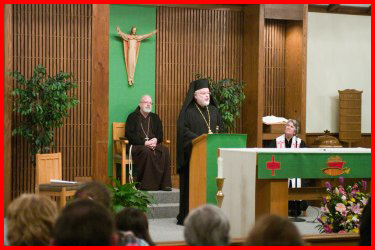
Metropolitan Methodios delivers his reflection
I was pleased that so many people came to the service. The Church was filled, and there were representatives from the Council of Churches. Rev. Diane Kessler, head of the council for over 30 years, was there. We all thanked her for the job she has done. I praised her for her wonderful work on behalf of unity. She never trivializes the differences between the churches but at the same time is always able to bring us together in friendship. Her role has been extremely positive, and we were happy that she was recognized for her work.
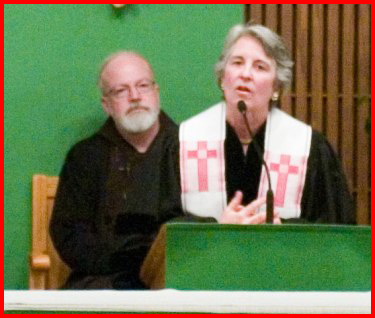
Rev. Kessler
During the service, they asked me to recite the Apostles Creed in Latin to represent the Western Church and Metropolitan Methodios recited it in Greek. We then invited all the assembly to recite it in English.
I told the people that an old tradition in the Church says that that this creed was composed by the apostles on Pentecost, and each apostle wrote one phrase for the creed. Now, there�s no historical proof of that. But we do have indications that this creed was used in the baptismal ceremonies in the very early Church. So, tradition and the fact that it�s called the Apostles Creed shows just how ancient it is.
We are people of the creed by our faith in God, in the Trinity, in the incarnation, the resurrection of Jesus and the virgin birth. All our faith is there in this simple prayer that for 2,000 years Christians have been praying � Catholics, then Orthodox and then Protestants. We�ve all prayed this same creed, and it is one of the things that unites us as Christians � as Jesus� followers. I was very pleased to see that used as part of our Ecumenical Service.
The Creed in Latin:
Credo in Deum Patrem omnipotentem; Creatorem coeli et terrae.
Et in Jesum Christum, Filium ejus unicum, Dominum nostrum; qui conceptus est de Spiritu Sancto, natus ex Maria virgine; passus sub Pontio Pilato, crucifixus, mortuus, et sepultus; descendit ad inferna; tertia die resurrexit a mortuis; ascendit ad coelos; sedet ad dexteram Dei Patris omnipotentis; inde venturus (est) judicare vivos et mortuos.
Credo in Spiritum Sanctum; sanctam ecclesiam catholicam; sanctorum communionem; remissionem peccatorum; carnis resurrectionem; vitam oeternam. Amen.
The Creed in English:
I believe in God, the Father almighty, creator of heaven and earth.
I believe in Jesus Christ, his only Son, our Lord. He was conceived by the power of the Holy Spirit and born of the Virgin Mary. He suffered under Pontius Pilate, was crucified, died, and was buried. He descended to the dead. On the third day he rose again. He ascended into heaven, and is seated at the right hand of the Father. He will come again to judge the living and the dead.
I believe in the Holy Spirit, the holy catholic Church, the communion of saints, the forgiveness of sins, the resurrection of the body, and the life everlasting. Amen.
I always try to give importance to the recitation of the creed at Mass. In Latin and in Greek it�s called �the symbol.� It�s called this in the sense that �the symbol� was like a “tessera.” In ancient Rome when people would part, sometimes they would take a coin and break it up and each would take a piece. Then when they came back together, they would reassemble the pieces. That symbol was called a “tessera,” and the creed shares that sense in that it is like a password. Both are signs of identification. So, as we pray the creed, it is one more sign of our unity with each other, our unity in faith � one Lord, one faith, one baptism.
In this context of working and praying for Christian Unity, I am looking forward to the joint pilgrimage that we will have after the summer with people from the Greek Orthodox and Catholic Churches in Boston traveling together. The pilgrimage will depart from Boston on September 16. The pilgrims will stay three days in Rome, three days in Istanbul and some will spend and additional three days in St. Petersburg, Russia. Those interested in joining us on this pilgrimage can contact our Office for Ecumenical and Interreligious Affairs at 617-435-0019 for more information.
– – –
On Thursday, we had a meeting with the auxiliary bishops and the vicars from throughout the archdiocese. The vicars forane are priests who have responsibility in their area to help promote the priestly life and to work with the auxiliary bishops. They have a leadership role in their local communities
We have periodic meetings with them. Yesterday was a very productive meeting. We talked about the need for parish collaboration in the various areas of the archdiocese. They shared with us information about what is happening in their regions. Each of the vicars is responsible for calling a monthly meeting of the priests in their area. In those meetings they discuss the themes that are being discussed at the Presbyteral Council, so it�s a way of allowing the priests out at the parishes to have a voice and input into the central administration of the archdiocese. The vicars have an important role in that whole system of communications.
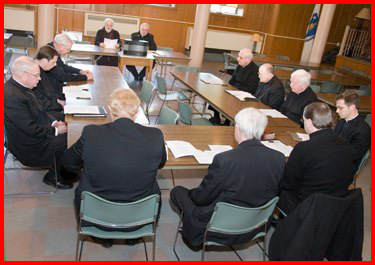
The bishops and vicars meeting
We are anxious to strengthen the role of the auxiliary bishops and the regional structure of the archdiocese. In fact, there is a new cabinet member for the regions, Sister Marian Batho.
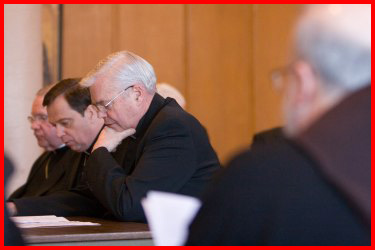
Bishops Dooher, Hennessey and Edyvean
The meeting was extended so the vicars could meet with the members of the Archdiocesan Pastoral Council (APC). We had the council members break up by regions with their auxiliary bishops so they could discuss how the APC could be more plugged in to their regional structure.
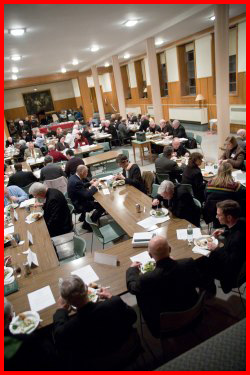
At the APC we were seated around U-shaped tables, by region
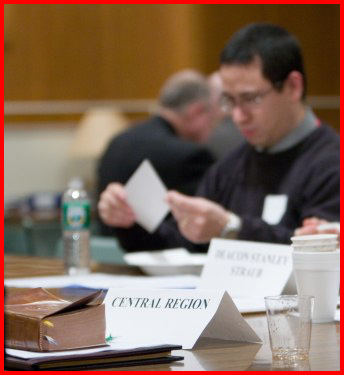
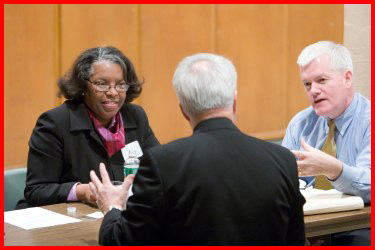
There were many fruitful discussions
Then we had a long discussion on the celebrations of the archdiocesan bicentennial. Father Bob Connors and other members of the bicentennial committee gave us a fine presentation on the bicentennial observances.
After the report on the bicentennial, the meeting continued just with the members of the APC. At that point it was information sharing and everyone who has a particular idea or a suggestion can address it to myself or the vicar general. It is always a very valuable part of the meeting.
This Saturday I will preside the Mass of ordination of seven transitional deacons, who will be ordained to the priesthood in May. Pray for them, and I look forward to sharing that joyous event with you in next week�s post.
Yours in Christ,
Cardinal Se�n
